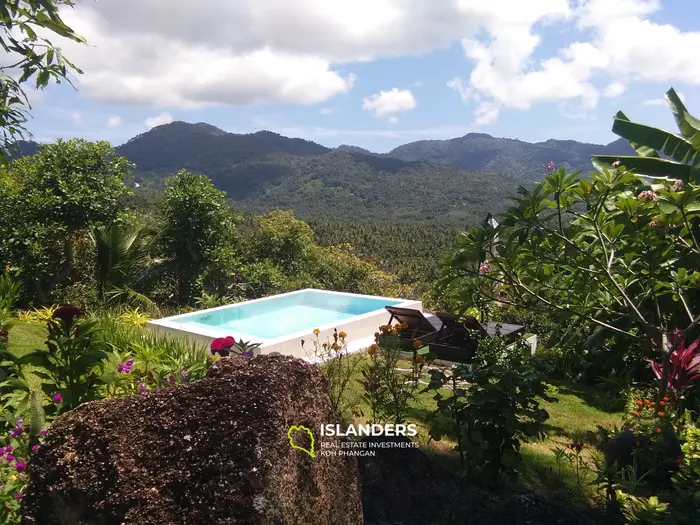Koh Phangan is a picturesque island in
Thailand, which every year attracts more and more foreign citizens dreaming of
a cozy home on the seashore. This place is known for its relaxed atmosphere,
clean beaches and rich nature, making it an ideal place for both temporary
residence and permanent residence. The growing interest in buying property on
Koh Phangan is explained not only by the natural beauty, but also by the
favorable conditions that the local real estate market offers. However, despite
all the attractive aspects, the process of purchasing real estate by foreigners
in Thailand has its own characteristics and limitations, which you need to know
in advance in order to avoid possible legal difficulties and financial risks.
Legal aspects of buying real estate in
Thailand
The purchase of real estate in Thailand
by foreign citizens is subject to strict laws that significantly limit their
rights to own land. By law, foreigners cannot own land directly, which is one
of the key barriers for those who want to buy a house with a plot. However, despite
these restrictions, foreigners can freely purchase apartments in apartment
buildings (condominiums), provided that the share of foreign owners in the
building does not exceed 49% of the total area of all apartments.
This system allows foreigners to own
property in Thailand, but requires careful compliance with all legal rules and
regulations. In addition, there are other legal ways to own real estate, which
involve long-term land leases or the creation of Thai companies with limited
participation of foreign citizens. It is important to understand that any real
estate transaction must be carefully vetted and legally documented to avoid
breaking the law and protect your investment.
Property Ownership Options for
Foreigners
For foreign citizens wishing to purchase
property on Koh Phangan, there are several legal ownership options, each with
its own conditions and restrictions. Let's take a closer look at them.
Buying an apartment in a condominium
Foreigners can purchase apartments
(condominiums) in Koh Phangan, which is one of the most popular ways to own
property. According to Thai law, foreigners can own up to 49% of the total area
of all apartments in a condominium. This means that the remaining 51% must be
owned by Thai citizens or Thai entities. When purchasing an apartment, a
foreign citizen must provide confirmation of the legal source of funds
transferred from abroad, which is a prerequisite for registering ownership.
Land lease
Since foreigners cannot own land
directly, one alternative is long-term lease. Foreigners can lease land for up
to 30 years with the option to renew for two more terms, making this option
almost equivalent to ownership. This option is popular among those who want to
build a house or run a business on Koh Phangan. The lease agreement must be
registered with the land department, and the tenant has the right to renew the
agreement, thereby ensuring the long-term use of the land.
Company formation in Thailand
Another way to own land is to form a Thai
company. A foreign national can own up to 49% of the company's shares, while
the remaining 51% must be owned by Thai citizens. A company may own the land on
which a home is built or a business is conducted. However, it is important to
remember that the Thai authorities carefully enforce this rule, and shell
structures where the Thai partners have no real interest in the company may be
considered illegal. Therefore, it is important to carefully select partners and
consult with lawyers when creating a company.
Buying a house without owning land
Foreigners can purchase a house or other
building without the right to own the land on which it is located. In this
case, the house is registered separately from the plot, and the owner must
enter into a long-term lease agreement for the land, as described above. This
option is possible, for example, if a foreign citizen wants to own real estate
on Koh Phangan, but does not want to create a company. This approach requires
careful legal preparation to ensure that the owner's rights are protected.
The process of buying property on Koh
Phangan
The process of buying property on Koh
Phangan includes several key steps that must be followed to complete the
transaction successfully and safely.
Search for real estate and conclusion of a contract
The first step is to select a suitable
property. This can be done through real estate agencies or directly through
sellers. After selecting an object, the buyer and seller enter into a
preliminary purchase and sale agreement, which usually includes the terms of
the transaction, terms and amount of the deposit. At this stage, it is
important to clearly specify all the conditions in order to avoid
misunderstandings in the future.
Legal due diligence of real estate
After signing the preliminary contract,
due diligence of the property follows. It includes checking the seller’s
ownership rights, the presence of debts, restrictions or encumbrances on the
property, as well as the compliance of documents with current legislation. At
this stage, it is recommended to involve an experienced lawyer who will conduct
a detailed analysis and make sure that the transaction is legal and safe for
the buyer.
Participation of a lawyer and translator
Buying real estate in Thailand requires
the participation of professionals. A lawyer will help you at all stages of the
transaction, from checking documents to registering property rights. If the
buyer does not speak Thai, it is necessary to involve a certified translator
who can translate all documents and explain the legal aspects of the
transaction.
Payment and registration of property rights
After completing the due diligence and
approval of all terms of the transaction, the buyer transfers the remaining
amount for the property to the seller’s account. It is important that all
transfers are made through bank accounts, which is required to register the
transaction with the land department. Once payment is made, the parties sign
the final sales contract and the title is registered to the new owner. This
stage includes payment of taxes and fees associated with the transfer of
ownership.
Taxation and additional expenses
When purchasing and owning real estate in
Thailand, foreign citizens need to take into account taxation and additional
expenses that arise both during the transaction and during the further
ownership of real estate.
Property transfer taxes
When purchasing real estate in Thailand,
the main tax is the transfer tax. Its rate is 2% of the registered value of the
property, which may differ from the actual transaction value. This tax is
usually paid by either the seller or the buyer, depending on the agreement
between the parties.
Rent tax
In case a foreign citizen rents land or
property in Thailand, the landlord must pay rental tax, which is 12.5% of the
annual rental income. However, in some cases, tax may be included in the rental
price, which must also be taken into account when signing the contract.
Stamp duty and special business tax
In addition to property transfer tax,
buyers may also face stamp duty and Specific Business Tax (SBT). Stamp duty is
levied at 0.5% of the registered value if the property has been in the seller's
possession for more than five years. Otherwise, SBT will be charged at 3% of
the assessed value of the property plus an additional council tax (0.3% of
SBT).
Annual property taxes
Property owners in Thailand are required
to pay an annual property tax, the rate of which depends on the type of
property and its value. In 2020, a new law on land and buildings tax was
introduced, which provides rates from 0.01% to 0.3% depending on the intended
use of the property (residential, commercial or agricultural). It is important
to note that taxes are subject to change, so you should regularly check current
rates and requirements.
Additional costs
In addition to taxes, real estate buyers
should be prepared to pay various additional costs, such as:
●
Legal services. Attorneys' fees for document
verification and transaction support;
●
Translation services. Payment for translator
services to translate documents into the required language;
●
Costs for registering a transaction. Fees for
processing and registering a transaction in the land department;
●
Real estate valuation. Costs for the services
of an appraiser to determine the market value of real estate.
Considering all the above-mentioned taxes
and fees, it is important to carefully plan your budget for buying and owning
real estate in Thailand to avoid unexpected financial costs.
Risks and Precautions
Purchasing real estate in Thailand for
foreigners is associated with certain risks that may arise at each stage of the
transaction. To minimize possible problems and avoid serious financial losses,
you need to take a number of precautions.
Legal risks
One of the main risks is an incorrectly
executed transaction or the purchase of real estate that does not comply with
legal requirements. For example, purchasing land that is prohibited for foreign
ownership may result in the deal being voided. To minimize this risk, it is
important to hire a qualified lawyer who is familiar with local laws to review
all documents and ensure the legality of the transaction.
Fraud risks
The real estate market, especially in
popular tourist areas, can attract scammers who offer non-existent or
distressed properties. To avoid such situations, it is recommended to cooperate
only with trusted real estate agencies and law firms that have a good
reputation and experience in the given region.
Financial risks
It is necessary to take into account
fluctuations in exchange rates, which may affect the cost of the transaction,
especially when transferring funds from abroad. In addition, it is important to
take into account all tax obligations and additional expenses to avoid
misunderstandings and unexpected expenses in the future.
Risks associated with renting and owning
With long-term land leases, there may be
risks associated with the extension of the lease agreement or changes in
legislation that may affect the terms of the lease. To minimize this risk, it
is recommended that you enter into a renewable lease and regularly check for
changes in laws and consult with legal counsel.
Choosing reliable partners
A key aspect of a successful transaction
is the choice of reliable partners - lawyers, real estate agencies and
translators. It is recommended to choose professionals with experience in
Thailand and positive reviews. It is also important to conduct a detailed
review of all documents and legal aspects of the transaction before its
completion.
Risks when registering property rights
Registration of ownership of real estate
must be carried out strictly in accordance with Thai law. It is important to
ensure that all documents are properly completed, registered with the land
department, and all taxes are paid in full. Otherwise, problems may arise with
the registration of property or with the further use of the property.
Features of the real estate market on Koh
Phangan
The real estate market on Koh Phangan has
shown steady growth in recent years, due to increased interest from both
foreign buyers and the local population. The island is attractive for its
natural beauty, tranquil atmosphere and relative affordability compared to
other popular destinations in Thailand such as Koh Samui or Phuket.
Popular areas to buy
Koh Phangan has several key areas that
are most popular among property buyers. These areas include:
●
Haad Rin – famous for its parties, but also
offers a wide range of permanent residence and investment properties;
●
Thong Nai Pan is a quieter and more secluded
area, attracting those looking for a peaceful place to live or relax;
●
Sri Thanu and Chaloklam are popular among
those who value beautiful beaches and proximity to local infrastructure; houses
and villas are often bought here;
●
Bantay and Haad Yao attract investors and
buyers focused on long-term investments in rental properties.
Price ranges
Property prices on Koh Phangan vary
depending on the area, type of property and proximity to the sea. On average,
apartments (condominiums) start at $50,000, while villas or houses can cost
anywhere from $150,000 to several million dollars, depending on the level of
luxury and location. In some prestigious areas, prices for villas with sea
views can reach $500,000 or more.
Forecasts for the future
The Koh Phangan property market continues
to attract the attention of foreign buyers and investors, especially as the
island grows in popularity among tourists and expats. Demand for real estate is
expected to increase, leading to further increases in prices. However, the
market may be affected by various factors, such as changes in laws regarding
foreign ownership or global economic fluctuations.
Factors influencing the value of real estate
The cost of real estate on Koh Phangan
depends on several key factors:
●
Properties with sea views or close
proximity to beaches are always rated higher;
●
The development of local
infrastructure, including accessibility to shops, restaurants, schools and
medical facilities, significantly affects the price;
●
Areas popular with tourists are
especially valued for their rental properties, making them attractive to
investors;
●
The cleanliness of beaches, water
quality and the overall level of environmental safety play an important role in
the valuation of real estate.
Overall, the property market on Koh
Phangan remains attractive for investment, especially for those looking for the
opportunity to combine comfortable living with a profitable investment.
Conclusion
Buying property on Koh Phangan represents
an interesting opportunity for foreign citizens seeking to acquire their own
home on one of the most picturesque islands in Thailand. However, this process
requires a careful approach and careful preparation. It is important for
foreigners to consider the legal aspects associated with owning real estate,
choose reliable partners and consultants, and be prepared to comply with all
legal requirements and pay taxes.
Despite existing restrictions under Thai
law, foreigners have several legal options for owning real estate, such as
buying a condominium unit, leasing land or forming a Thai company. Each of
these options requires detailed study and legal support to avoid risks and
ensure reliable protection of your investments.
The property market on Koh Phangan
continues to develop, offering a variety of housing options and investment
opportunities. Demand for property on the island is expected to increase, which
could lead to increased prices and investor interest. However, as in any other
investment project, it is necessary to carefully analyze all aspects of the
transaction and make informed decisions.



